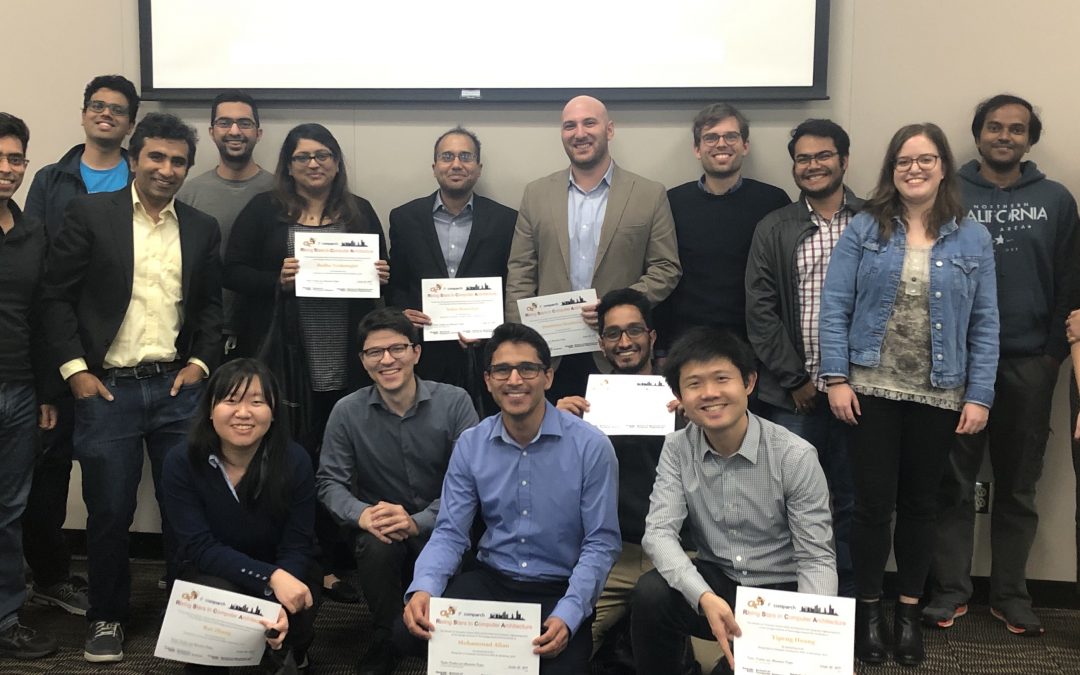On October 25th, seven Ph.D. students and post-doctoral researchers traveled to Georgia Tech for the Second Rising Stars in Computer Architecture (RISC-A) Workshop. RISC-A is an all-day event for final-year Ph.D. candidates and post-doctoral students who are pursuing an academic career. This year’s forum was organized by Assistant Professors Alexandros Daglis (Georgia Tech SCS) and Tushar Krishna (Georgia Tech ECE).
The primary goal of RISC-A is to prompt faculty candidates in the area of Computer Architecture to start preparing for their job applications and interviews early, offer them the opportunity to present their work and receive feedback on how to improve, as well as shed light on what to expect before, during, and after their academic interviews.
Workshop Logistics and Schedule
We solicited applications by submitting a call for participation to RISC-A on SIGARCH website and received 16 highly competitive applications. Each application comprised a one-page research statement, a CV, and a letter of recommendation from the applicant’s academic advisor. Because of the Workshop’s single-day duration and a format where each invitee was given an individual presentation slot, we could only accommodate up to seven invitees. After a tough selection process, the seven invitees were: Mohammad Alian (UIUC), Yipeng Huang (Columbia/Princeton), Yatin Manerkar (Princeton), Dimitrios Skarlatos (UIUC), Gokul Subramanian Ravi (U Wisconsin-Madison), Radha Venkatagiri (UIUC), and Rui Zhang (UNC).
With seven invited speakers, up from last year’s six, we ended up with a dense schedule. The workshop opened with breakfast and a welcome from the workshop’s chairs, SCS Chair Mostafa Ammar, and ECE Associate Chair for Research Justin Romberg. The core of the schedule comprised a research presentation by each of the seven invitees and a panel. Each invitee was given 45 minutes to present their research and receive individual feedback. The panel’s topic was entitled “Life in Academia – A View from the Other Side”, featuring panelists from Georgia Tech’s SCS and ECE faculty: Paul Pearce, Arijit Raychowdhury, Vivek Sarkar and Alenka Zajic. The panelists shared experiences from their academic career path, offered advice for faculty candidates, and answered a plethora of questions from a very engaged audience. In addition to the seven invited speakers, the audience comprised 30-40 Georgia Tech graduate students and faculty.
Feedback from RISC-A Invitees
The feedback we received from the workshop’s attendees was majorly positive. In addition to the comments and questions they received during and after their presentations, the invited presenters appreciated the fact that RISC-A drove them to start preparing early: compose a first draft of their research statement and start thinking about their job talk, which–they came to realize–is neither a conference talk nor a defense talk, but something else altogether. The local Georgia Tech students in the audience also felt that they benefited greatly, by being directly exposed to their colleagues’ efforts and the offered feedback.
We also received a couple of improvement suggestions, to be taken into consideration for next iterations of RISC-A. One idea was to record the whole workshop, to enable people not physically present to also benefit from the workshop’s content, as well as allow presenters to go back and review and evaluate their own talk. Another improvement suggestion was to enrich the audience with faculty from other areas of computer science, outside architecture. We agree that this is a key action point for improvement, as addressing a wide computer science audience is one of the primary challenges for junior academics hitting the market right after their Ph.D.
Thoughts on the future of RISC-A
After two successful iterations of RISC-A, we believe this is an effort worth continuing. We want to pursue directions that will promote inclusivity, by allowing more architecture students to present and attend. A few options we are considering are:
- Change the format of the workshop to accommodate more students. For instance, reduce the number of presentation slots to make time for a poster session, or extend the workshop’s duration to two days.
- Move RISC-A to a different location every year, by making the workshop a joint effort co-organized by more universities, taking a turn similar to MIT’s EECS Rising Stars forum. Such a format would also allow Georgia Tech graduate students to apply (they have not been qualified to do so because of a conflict of interest).
- Convert RISC-A from an independent workshop to a full-day workshop co-located with MICRO, which would have a number of benefits. First, MICRO is well-timed, taking place before faculty candidates start preparing their application materials. Second, many graduate students will be able to attend. Third, travel costs will be amortized.
All of the aforementioned directions require additional effort in terms of inter-institutional collaboration and funding sources. The past two iterations of RISC-A at Georgia Tech were generously funded by Georgia Tech’s School of Computer Science, School of Electrical Engineering and the CRNCH Research Center. Please get in touch if you are interested in getting involved with future iterations of RISC-A.
About the Authors: Alexandros Daglis is an Assistant Professor in Computer Science at the Georgia Institute of Technology, working on architectures for low-latency network communication and server systems. Tushar Krishna is an Assistant Professor in Electrical and Computer Engineering at the Georgia Institute of Technology, working on flexible DNN accelerators, and on-chip/on-package interconnection networks.
Disclaimer: These posts are written by individual contributors to share their thoughts on the Computer Architecture Today blog for the benefit of the community. Any views or opinions represented in this blog are personal, belong solely to the blog author and do not represent those of ACM SIGARCH or its parent organization, ACM.


